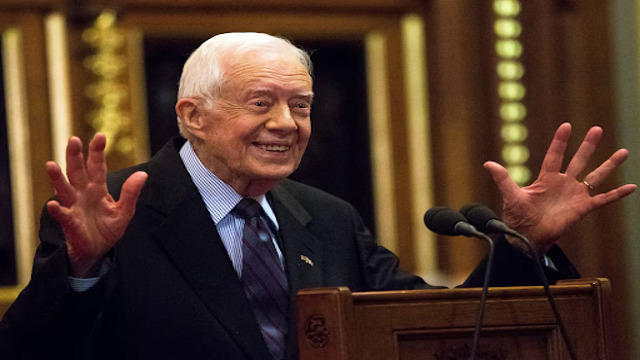
Former U.S. President Jimmy Carter gave a lecture at the House of Lords in London on February 3, 2016, focusing on efforts to eliminate the Guinea worm. The event highlighted his commitment to global health initiatives. Reuters
Jimmy Carter, the 39th President of the United States, passed away at his home in Plains, Georgia, on Sunday at the age of 100. Known as a humble peanut farmer turned politician, Carter's life was marked by dedication to public service, humanitarian efforts, and a legacy of peace, despite challenges during his presidency.
President Joe Biden has declared January 9 as a national day of mourning to honor Carter’s memory, urging Americans to gather in places of worship to pay tribute. Reflecting on Carter’s legacy, Biden emphasized his compassion and lifelong commitment to justice and democracy.
Carter's presidency, beginning in January 1977, came with a mix of successes and setbacks. One of his defining achievements was brokering peace between Israel and Egypt through the 1978 Camp David Accords, a historic agreement that ended years of conflict in the Middle East. Egyptian President Abdel Fattah al-Sisi praised Carter’s pivotal role in this peace process, highlighting its lasting significance.
However, Carter's time in office was also marred by economic struggles, including high inflation and unemployment, as well as the Iran hostage crisis. The 444-day ordeal, during which 52 Americans were held captive in Tehran, deeply affected public perception of his leadership. A failed rescue mission in 1980, resulting in the deaths of eight U.S. soldiers, further undermined his presidency. These issues contributed to his loss to Ronald Reagan in the 1980 election.
Despite leaving office with low approval ratings, Carter found a second calling as a global humanitarian and advocate for peace. His post-presidential work earned him widespread admiration, culminating in the Nobel Peace Prize in 2002. The prize recognized his efforts to promote human rights, resolve conflicts, and fight poverty worldwide. Through the Carter Center, he monitored elections in over 80 countries, championed disease eradication, and supported democratic initiatives.
Carter’s personal life was as notable as his public service. A devoted Southern Baptist, he brought a strong moral compass to the White House. His 77-year marriage to Rosalynn Carter was a cornerstone of his life. Together, they had four children and shared a commitment to public service. Rosalynn passed away in November 2023 at the age of 96, just months before Carter's own death.
As a former president, Carter was unafraid to express his opinions, even when controversial. He criticized U.S. foreign policy, including the Iraq war, and questioned the legitimacy of certain political outcomes. His diplomatic efforts sometimes caused tension, such as during negotiations with North Korea in the 1990s. Nevertheless, his resolve to seek peaceful solutions remained unwavering.
Carter’s influence extended beyond politics. He authored over 20 books, addressing topics from faith to diplomacy. His writings and actions reflected a life dedicated to fostering understanding and cooperation.
Public tributes and observances for Carter are planned in Atlanta and Washington, followed by a private burial in Plains. His legacy as a champion of peace and human dignity endures, inspiring future generations to prioritize compassion and unity.















